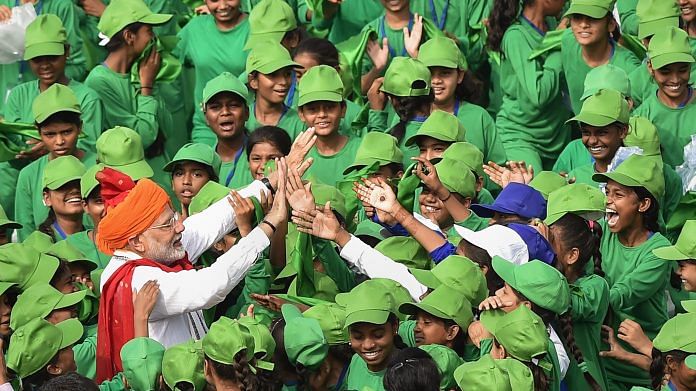The all-powerful Narendra Modi cannot undertake the task of helping India’s children alone. He must involve others.
UN secretary-general António Guterres is coming to India to participate in the culmination of Narendra Modi’s fortnight-long Swachhata hi Seva campaign on 2 October. Gandhi’s birth anniversary will also launch the government’s 150th anniversary celebrations of a man Modi clearly wants to identify with.
Along with Guterres, the executive director of the UNICEF, Henrietta H. Fore, will also be in New Delhi. The UNICEF is partnering with the ministry of drinking water and sanitation and its inimitable secretary, Parameswaran Iyer, in an effort to connect sanitation with the health of children in the country.
Henrietta Fore will go to the National Stock Exchange and ring the bell – a bell that constitutes two warnings and one urgent request.
The first warning is that time’s up for India’s children if the government doesn’t put all the ministries working for children into mission mode.
Question is how is that to be if Modi prefers his bureaucrats to his ministers? Certainly, Parameswaran Iyer is a deeply committed man who threw up a lucrative job with the World Bank in the US to come back and work with the Swachh Bharat programme, and nothing in this column takes away from the time he has spent putting the grand sanitation mission in place.
Also read: Expired medicines, no doctors & equipment: What audit of India’s govt health scheme found
But what about the ministers who are supposed to lead the drinking water and sanitation ministry? Cabinet minister Uma Bharti, former CM of Madhya Pradesh and six-time MP, spent her young adulthood in the service of the Ram Janmabhoomi movement. Today, she is sulking somewhere. She hardly attends Parliament.
As for Ramesh Chandappa Jigajinagi, minister of state, even fewer people know anything about him. He has been answering questions in Parliament.
As the 2019 polls draw nearer, and the height and reputation of the Prime Minister in India’s eyes grows, the converse is also true – everybody else’s image in the NDA, save for party president Amit Shah, is being obliterated.
Jigajinagi is a perfect example. He is a five-time MP from Bijapur (earlier Chikkodi), from Karnataka. He is Dalit (that enough should have brought him to the attention of the PM. It hasn’t). He was a protégé of Ramakrishna Hegde and joined the BJP after Hegde’s death. He understands the value of alliances. He was a revenue minister in the Karnataka government before he was brought to the Centre in 2016.
So why aren’t Uma Bharti and Ramesh Jigajinagi cutting ribbons, wielding brooms and patting children, along with PM Modi?
Clearly, Modi ji is much more comfortable with bureaucrats than with his cabinet colleagues. They listen. They don’t pretend to be equals. The smart ones work hard, but they don’t steal the show.
Also read: Before Modicare launch, over 33% children under 5 are stunted in these poll-bound states
Uma Bharti has made no secret of her unhappiness. She wanted to play a big role in the Madhya Pradesh assembly elections, but as of now, there’s nothing for her. It’s not clear what role Jigajinagi played in the recent Karnataka elections.
Henrietta Fore’s second warning at the National Stock Exchange is that India’s children are in grave danger, period. A study by Lancet found that it was not enough for health care to be universal, it also had to be of a certain quality. The reputed journal quoted the Janani Suraksha Yojana set up in India, 13 years ago.
“…(This) has provided cash incentives for women to deliver their children in health facilities and has increased coverage of facility birth for more than 50 million women, but these incentives have not improved maternal or newborn survival,” the study said.
In two days, the most backward district of Mewat in Haryana will witness the rolling out of the Pradhan Mantri Jan Arogya Yojana or Ayushman Bharat. The PM will travel to Jharkhand to roll out the most ambitious health care scheme in the world – Rs 5 lakh annual coverage per family, to benefit 10 crore poor families. It might be worthwhile if he reads the Lancet study on the plane journey to Ranchi.
But when Fore rings the bell at the National Stock Exchange, the UNICEF chief will also be requesting attention towards India’s children. She wants to tell the private sector, and not just the government, that all Indians must contribute towards improving the health of its young ones.
The 2 October ceremony will certainly be something to watch. Modi is lending his political weight to putting India’s children front and centre. Around 40 ministers from all over the world are coming. It would be a pity if this urgent mission gets lost in everyday politics.
Also read: India’s politicians need to wake up and see the malnutrition crisis: Shashi Tharoor
That’s the point of this incredible initiative. Modi knows better than anyone else that the success of any project is directly proportional to the attention it is given. This also means that the all-powerful Modi cannot undertake such a humungous task alone.
So along with Uma Bharti and Ramesh Jigajinagi, the PM might like to invite other leaders from other political parties on stage, those from the NDA certainly, as well as those from the UPA. After all, 2 October is a day that all of India remembers.
India’s children are at stake, so don’t hog the limelight. Share the credit. The Mahatma would have liked that.






